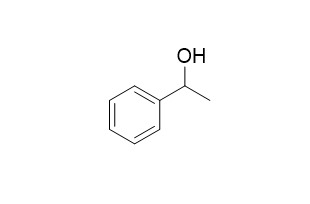1-Phenylethanol
1-Phenylethanol has a nongenotoxic mode of action responsible for the lung and liver tumors observed in mice following 2 years of inhalation exposure to ethylbenzene.
Inquire / Order:
manager@chemfaces.com
Technical Inquiries:
service@chemfaces.com
Tel:
+86-27-84237783
Fax:
+86-27-84254680
Address:
1 Building, No. 83, CheCheng Rd., Wuhan Economic and Technological Development Zone, Wuhan, Hubei 430056, PRC
Providing storage is as stated on the product vial and the vial is kept tightly sealed, the product can be stored for up to
24 months(2-8C).
Wherever possible, you should prepare and use solutions on the same day. However, if you need to make up stock solutions in advance, we recommend that you store the solution as aliquots in tightly sealed vials at -20C. Generally, these will be useable for up to two weeks. Before use, and prior to opening the vial we recommend that you allow your product to equilibrate to room temperature for at least 1 hour.
Need more advice on solubility, usage and handling? Please email to: service@chemfaces.com
The packaging of the product may have turned upside down during transportation, resulting in the natural compounds adhering to the neck or cap of the vial. take the vial out of its packaging and gently shake to let the compounds fall to the bottom of the vial. for liquid products, centrifuge at 200-500 RPM to gather the liquid at the bottom of the vial. try to avoid loss or contamination during handling.
Pharmaceuticals (Basel).2021, 14(10):1046.
Evid Based Complement Alternat Med.2016, 2016:4357656
Molecules.2023, 28(10):4121.
JLiquid Chromatography & Related Tech.2021, 10826076.
Research Square2021, March 3rd.
Int J Nanomedicine.2022, 17:6513-6525.
Environ Toxicol.2023, 23929.
Hanoi University of Pharmacy2023, 14(1):30-39.
Mol Med Rep.2022, 25(1):8.
Eur J Pharmacol.2024, 978:176749.
Related and Featured Products
Archives of toxicology, 2006, 80(12):868-872.
In vivo micronucleus test in mice with 1-phenylethanol.[Reference:
WebLink]
1-Phenylethanol is one of the major primary phase-I metabolites of ethylbenzene. In principle it may yield an electrophilic intermediate by phase-II metabolism. Because of the extensive use of ethylbenzene as a solvent, 2-year carcinogenicity inhalation studies were carried out leading to renal hyperplasia and tubular neoplasms both in male and female rats and alveolar/bronchiolar neoplasms in male mice and hepatocellular neoplasms in female mice. Whereas the mechanism underlying the increased renal tumor incidences in rats has been clarified, the mechanism of tumor formation (genotoxic or nongenotoxic mode of action) in the lung and liver of mice is still unclear.
METHODS AND RESULTS:
The genotoxicity data available to date for 1-Phenylethanol include in vitro studies using either bacteria (Salmonella reverse mutation assay, E. coli Pol A(+)/Pol A(-) test) or mammalian cells (mouse lymphoma assay, chromosome aberration test and sister chromatid exchanges using CHO cells). These experiments, however, did not always follow current standard procedures and some of the data obtained are compromised and not always convincing. The present database thus does not allow a definitive assessment of the in vitro genotoxic potential of 1-Phenylethanol. The in vitro database suggests that clastogenicity may be the most relevant genetic end point, and therefore an in vivo micronucleus assay in mouse bone marrow was carried out. The animals were given 1-Phenylethanol in single oral doses up to the maximum tolerated dose of 750 mg/kg body weight. Bone marrow was sampled 24 and 48 h after treatment. Under the experimental conditions used, there was no evidence of increased micronuclei frequencies at any dose or sampling time.
CONCLUSIONS:
These findings indicate that 1-Phenylethanol is not clastogenic in vivo. This information, together with other negative or inconclusive genotoxicity data available so far, suggests a nongenotoxic mode of action responsible for the lung and liver tumors observed in mice following 2 years of inhalation exposure to ethylbenzene.



